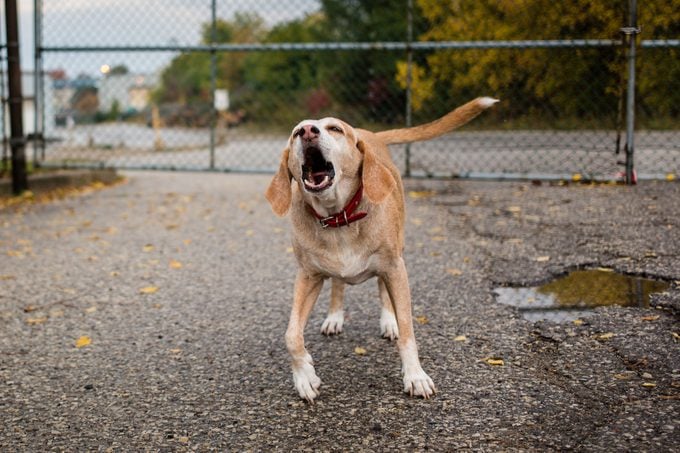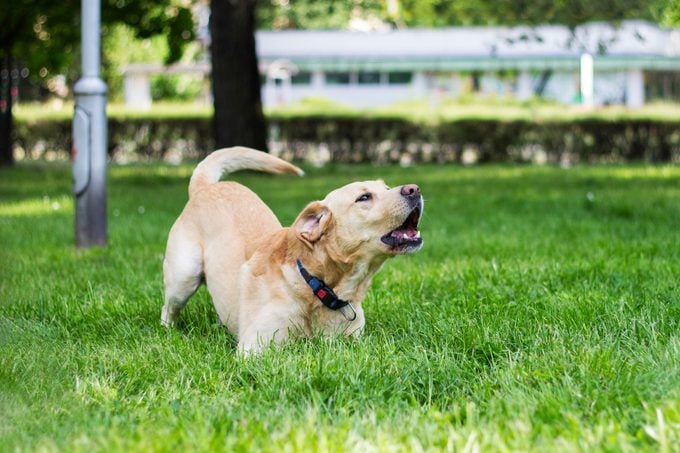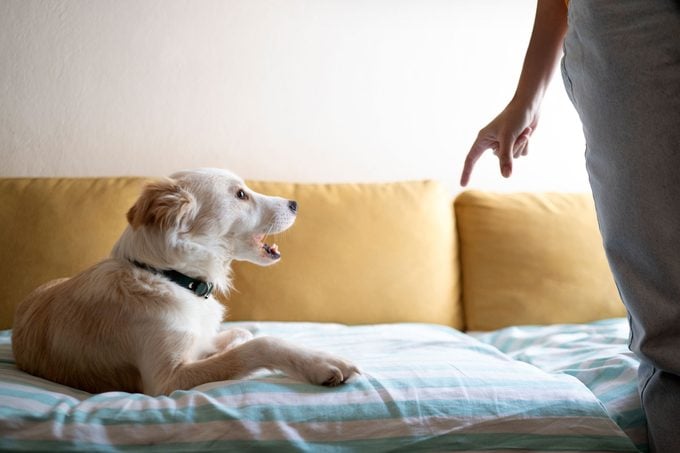Why Do Dogs Bark—and How to Stop a Dog from Barking Too Much
Updated: Apr. 23, 2024

Understanding the reasons why dogs bark can help us meet their needs and reduce unwanted barking, creating a more peaceful home for humans and pups alike
When my husband and I adopted our first dog in 2010, we never asked ourselves the question, “Why do dogs bark?” Instead, we spent time wondering whether our dog would ever let out a woof. Rio, a Labrador retriever mix, didn’t bark for the first several months in our home. We even wondered if he was part basenji, known as the “barkless dog.” Then one night as we were sleeping, a mighty woof sounded throughout the house. It turned out that Rio was having a little stomach upset and barked to let us know. Though initially startled, we appreciated him giving us a heads-up that he needed to go outside to do his business. A decade later, when arthritis prevented him from climbing stairs, he’d rest on a bed at the base of the stairwell and bark to let us know he wanted company.
Our newest member of the pack, a Yorkshire terrier mix, does not save barking for special occasions. Tux loves to race along the fence line, barking at passersby. He barks when the doorbell rings. He barks at random dogs on leashed walks. Sometimes he even lets out little yips in his sleep. Clearly, Yorkies are not a quiet dog breed.
While some dogs may bark more than others, barking is a normal part of dog behavior and an important way that they communicate, according to veterinarian Nicholas Dodman, BVMS, co-founder of the Center for Canine Behavior Studies. While it might seem like dogs bark for no reason, “it’s always related to something,” he says. “It signals different things.”
Ahead, veterinarians, dog behaviorists and dog trainers explain why dogs bark and how to stop your dog from barking quite so often. Read on for help translating this common doggy language.
Get Reader’s Digest’s Read Up newsletter for more pets, humor, travel, tech and fun facts all week long.
About the experts
Reviewed for accuracy by: Wailani Sung, DVM, a vet with a board certification in veterinary behavioral medicine who owns Bay Area Vet Behavior. Dr. Sung is the co-author of From Fearful to Free: A Positive Program to Free Your Dog from Anxiety, Fears and Phobias. |
What does it mean when a dog barks?
Veterinarian Andy Roark, DVM, host of the podcast The Cone of Shame, says we can better understand why dogs bark by imagining what it would be like if humans could not speak and our primary communication tool was a horn. “You can’t speak, you can’t make elaborate hand gestures, you can’t do anything except honk this horn,” he says. “Think about how you would use that horn.”
Chances are, you’d use that horn much like our four-legged pals use their voices. Keep reading to find out the top reasons why dogs bark.
They’re bored
If a high-energy dog is locked in a crate while its humans are at work, it’s probably going to bark either to pass the time or to summon someone to release it. “Boredom is hard on people. We whip out our cell phones and start scrolling,” says Dr. Roark. “Our dog doesn’t have a cell phone. They’ve just got this ‘horn.'”
They’re protecting their territory

Barking an alert—aka territorial barking—has long been ingrained in dogs. It’s one reason why some people still consider the top guard dog breeds when choosing a pet. “Fifteen thousand years ago, when human beings were sitting around a fire, dogs were lying on the periphery. If anything rustled in the bushes, the dog would start barking,” says Dr. Dodman. “That was a useful warning of approach by a different tribe or some dangerous wild animal. Of course, we don’t have the campfire and the wild animals so much these days, but you will notice that dogs will bark in the house when the mailman comes.”
They’re fearful
Why do dogs bark when fireworks burst in the sky or thunder booms overhead? For the same reason they bark at other dogs on walks: They’re afraid. “When a dog is frightened, he has the opportunity for fight or flight,” Dr. Dodman says. “But when you’re on a leash, you can’t run away.”
They’re excited

In contrast to a fearful dog, an excited dog barks during the thrill of play with people and pets. Think of the adrenaline rush! People can confuse play barking and fear barking, so it’s important to pay attention to canine facial expressions and body language to avoid a bite, according to Dr. Dodman.
“With play, the mouth gives a lot away: It’s usually open, and the tongue may be falling out the side. The ears are not pinned back—or forward—and the tail may be wagging,” he says. “With fear, it could be that the jaw is clamped tight, the tail may be somewhat tucked and the hackles will be raised. The dog may be looking tense and/or backing away, and [it may be] barking with a lower tonality, more threatening and warning.”
They want something
There’s a long list of what dogs want—yours might bark because it wants attention, food, a walk or a game of fetch. When we respond by giving them what they want, it reinforces that behavior.
For instance, Dr. Roark’s dog, Skipper, expects dinner every evening at 5:50 p.m. and barks if Dr. Roark loses track of the time. Sometimes Skipper tries to push his luck and barks early at 5:30 p.m. “I don’t respond to his bark then because if I do, he will simply push dinnertime earlier,” he says with a laugh.
They have separation anxiety

When left alone, dogs with separation anxiety might destroy furniture, stop eating, urinate indoors … and bark incessantly, as research published in the journal Applied Animal Behaviour Science shows. “There are about 10 different signs of separation anxiety, but one of the key signs is barking really continuously or for long periods of time when they’re left alone—much to the dismay of neighbors, especially in an apartment situation,” Dr. Dodman says.
There’s a medical issue
“If they’re yipping or vocalizing as they’re getting up or laying down, I’m worried about back pain, hip pain, things like that,” Dr. Roark says. “Is there something that’s causing them to cry out from their movements? I would be very aware of that.”
Why do dogs bark when they’re not feeling well? They have few ways to tell us, “I’m in pain!” So it’s important to pay attention to how and why your pooch is communicating.
Unusual barking in senior dogs can also indicate the onset of dog dementia, Dr. Roark adds. If you’re concerned about the noises your dog makes, contact your veterinarian.
How to prevent or stop unwanted barking
While some pet parents train their dogs to bark on command, many others wish their dogs weren’t quite so noisy. Fortunately, there are ways to address a dog that barks too much once you’ve figured out why it’s barking.
Offer enrichment
“We need to make sure their physical and mental needs are being met,” says certified professional dog trainer Nicole Ellis, CPDT-KA. For instance, if a dog is a fan of “demand barking” whenever it’s bored, take a long walk before a Zoom meeting and offer it a puzzle feeder or a Kong stuffed with canned dog food and then frozen. One of Ellis’s dogs, Rossi, will work on a frozen Kong for over an hour while Ellis works.
Redirect your dog

“When guests come over and your dog is barking with excitement, redirect them and ask them to sit, and reward that,” Ellis suggests. If your dog likes to bark every time it sees cats, practice the cue “come” with your dog. Then, whenever a cat saunters by, call your dog and reward it for coming by offering praise and a delicious treat, like chicken.
Erect visual barriers
If your dog barks whenever another dog walks past the window, simply close the curtains or blinds. You can also buy film that makes windows look foggy. “We add a little barrier so our dogs cannot just stare out the window and see these things that are really exciting for them,” Ellis says.
You can also create a sound buffer for outside noise by playing reggae or classical piano music, turning the TV to a calm station like the Weather Channel or using a white noise machine, she adds.
Ignore attention-seeking barking

A couple once asked Dr. Dodman for help with their Labrador retriever, who barked whenever they were having an in-depth conversation with each other. They dealt with it by giving the dog a “time out” in their truck—but the dog loved being in the truck and considered it a reward, so he kept barking to interrupt their conversations.
“You can eliminate attention-seeking barking by completely ignoring it: You continue what you’re doing. You don’t pay the dog any attention until the barking stops,” Dr. Dodman says. “Initially the dog will increase the intensity—it’s called an ‘extinction burst’—but if you can persist, after one week, the attention-seeking barking will be about 50% reduced. … After three weeks, it will be completely gone because it doesn’t work anymore.”
Practice triggering scenarios at home
For dogs that react to other dogs by barking, try playing YouTube videos of dogs (on a low volume) for your pup. “When he doesn’t bark, reward him,” Ellis says. You can also record a doorbell ringing on your cell phone and play that (again, at a low volume) and reward your dog for looking but not reacting.
Stay positive
Don’t yell or hit your dog if it barks too much. “With barking, it’s easy to become overly frustrated. It can be embarrassing and simply annoying,” Ellis says. “But it’s important to keep your cool because [when we get] frustrated, our dogs might actually start barking more. And we can create other problems if they become nervous with how we handle the situation, which can lead to reactivity and other problems.”
Get professional help when necessary

If your dog seems to bark because of stress and anxiety, Ellis recommends talking to a veterinarian. They might prescribe medication or recommend a pheromone diffuser to help your dog relax.
If your dog seems like one of the hardest dogs to train, a positive-reinforcement dog trainer can also help develop custom strategies for your pup.
Why trust us
At Reader’s Digest, we’re committed to producing high-quality content by writers with expertise and experience in their field in consultation with relevant, qualified experts. For this piece, Jen Reeder tapped her experience as a longtime pet journalist and former president of the Dog Writers Association of America, and then Wailani Sung, MS, PhD, DVM, DACVB, a board-certified veterinary behaviorist who owns Bay Area Vet Behavior, gave it a rigorous review to ensure that all information is accurate and offers the best possible advice to readers. For this piece, we relied on reputable primary sources, including professional organizations and published research studies, as well as our writer’s personal experience. We verified all facts and data and backed them with credible sourcing, and we will revisit them over time to ensure they remain accurate and up to date. Read more about our team, our contributors and our editorial policies.
Sources:
- Nicholas Dodman, BVMS, DACVAA, DACVB, professor emeritus at Tufts University, co-founder and CEO of the Center for Canine Behavior Studies and author of several books, including The Well-Adjusted Dog and If Only They Could Speak; phone interview, Feb. 28, 2024
- Andy Roark, DVM, MS, founder and CEO of the Uncharted Veterinary Conference; phone interview, March 1, 2024
- Nicole Ellis, CPDT-KA, Fear Free certified dog trainer and author of Working Like A Dog; phone interview, Feb. 29, 2024
- Applied Animal Behaviour Science: “Video analysis of dogs with separation-related behaviors”




